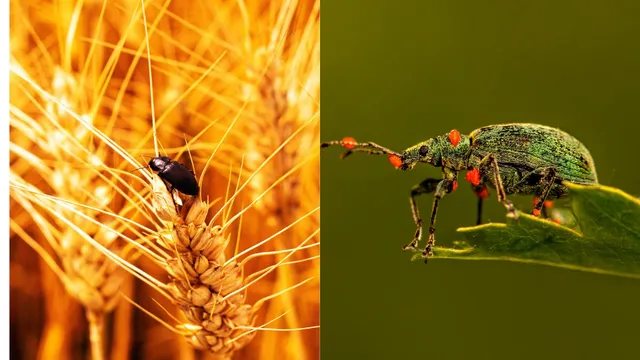- By Ajeet Kumar
- Wed, 04 Jun 2025 01:04 PM (IST)
- Source:JND
A Chinese couple entered the US last year with a "toxic fungus" accumulated in their backpack, theFBI said on Tuesday as they filed charges against them. According to the federal agency, the accused woman worked in a lab at the University of Michigan. Yunqing Jian, 33, and Zunyong Liu, 34, were charged with conspiracy, smuggling, making false statements and visa fraud.
"The alleged actions of these Chinese nationals, including a loyal member of the Chinese Communist Party, are of the gravest national security concerns," US Attorney Jerome Gorgon Jr said.
What is Fusarium graminearum?
The pathogen is known as Fusarium graminearum, which can attack wheat, barley, maize and rice and sicken livestock and people, news agency AP reported citing the FBI filing in Detroit court. The FBI said a scientific journal describes it as a "potential agroterrorism weapon."
Fusarium graminearum is a fungal plant pathogen that primarily affects cereal crops like wheat, barley, and maize. It causes Fusarium head blight (FHB), also known as scab, a devastating disease that leads to significant yield losses and reduced grain quality. The fungus infects the heads of cereal plants, particularly during flowering, under warm and humid conditions, leading to shrivelled or discoloured grains.
- Mycotoxins: Produces harmful mycotoxins like deoxynivalenol (DON, also called vomitoxin), zearalenone, and nivalenol, which contaminate grains and pose risks to human and animal health.
- Symptoms: White or pinkish fungal growth on grain heads, premature bleaching, and reduced seed quality.
- Spread: Through wind, rain, and infected crop residues, with spores surviving in soil or debris.
- Management: Crop rotation, resistant varieties, timely fungicide application, and cultural practices to reduce residue buildup.
It is a major concern in agriculture due to its economic impact and food safety risks.
ALSO READ: 'Threat To National Security': Chinese Couple Arrested By FBI For Smuggling Fungus Into US
What is agroterrorism?
Agroterrorism is the deliberate introduction of biological agents, such as pathogens, pests, or toxins, into agricultural systems to disrupt food production, cause economic damage, or harm human and animal health. It targets crops, livestock, or food supply chains to create fear, destabilise economies, or undermine public confidence in food security. It is considered a form of bioterrorism due to its potential to affect large populations and economies.
According to the definition presented by Interpol, agrocrimeis an unlawful act or omission concerning animals or animal products that violates legislation and has negative consequences on animal health, animal welfare, public health, food safety, food authenticity or national security.
Is agroterrorism preventable?
Yes, it is but at some extent. Although biosecurity measures, surveillance, rapid response systems, and international cooperation are widely considered to protect agriculture, these steps are very tough amid their quick nature of change. Animal
Motive behind agroterrorism and history
Agroterrorism is a subset of agrocrime. It can be understood as terrorist attacks directed against crops and livestock, to disrupt a population’s economy and food supply. The main motive behind agroterrorism is to damage crops and thus ruin a country's agri economy. Sometimes it is used as a political weapon to garner more votes. In 1984, a religious cult in Oregon deliberately contaminated salad bars with Salmonella bacteria to sway local elections. The attack caused over 750 illnesses, demonstrating the vulnerability of food systems to agroterrorism.
How did the FBI catch the Chinese couple?
In July 2024, Liu was turned away at the Detroit airport and sent back to China after changing his story during an interrogation about red plant material discovered in his backpack, AP reported citing the FBI. He initially claimed ignorance about the samples but later said he was planning to use the material for research at a University of Michigan lab where Jian worked and where Liu previously worked, the FBI said.The FBI said authorities found a scientific article on Liu's phone that was titled, "Plant-Pathogen Warfare under Changing Climate Conditions."
A week before arriving in the US, according to investigators, Liu exchanged messages with Jian, who said, "It's a pity that I still have to work for you." The FBI said Liu replied: "Once this is done, everything else will be easy." Months later, in February, FBI agents visited Jian at the campus lab. She said, "100 per cent no,” when asked if she had been assisting Liu with the pathogen at the lab. The FBI said it found a signed statement on her phone expressing her support for the Communist Party of China.
Messages between the two in 2024 suggest that Jian was already tending to Fusarium graminearum at the campus lab before Liu was caught at the Detroit airport, the FBI said. The university does not have federal permits to handle it. The US does not have an extradition treaty with China, which makes Liu's arrest unlikely unless he returns.
(With inputs from agency)

